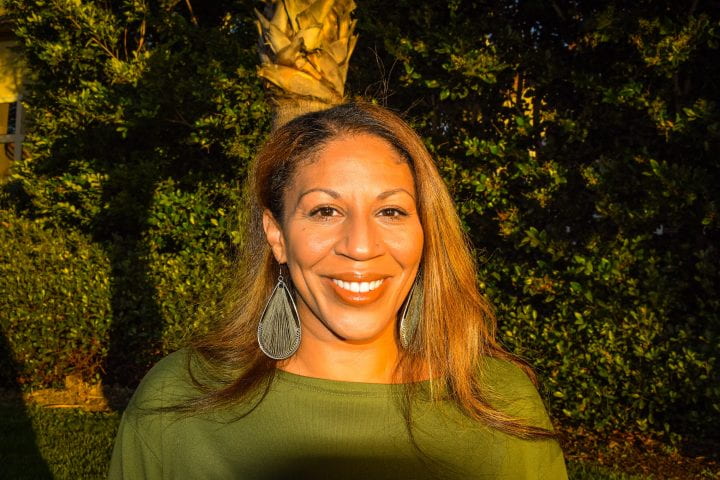
Nursing Professor Alison Holman (left) and PhD student Alex Jones-Patten.
Nursing PhD student Alex Jones-Patten was familiar with the Diverse Educational Community and Doctoral Experience (DECADE) program at UCI when Professor Alison Holman told her class about the need for student representatives.
The student would be dedicated to understanding the needs and pressures graduate students of color from underserved backgrounds may face that may thwart future success.
Jones-Patten signed up and teamed up with Holman, who is the school’s DECADE mentor.
About the DECADE program
The UCI DECADE program is offered through collaboration between Graduate Division and the Office of Inclusive Excellence.
As part of its mission to improve inclusive excellence, DECADE seeks to increase the participation and retention of women and underrepresented groups in graduate programs.
Through the program, a diverse community of UCI graduate students have a supportive network of faculty, staff and students. The program also provides resources to address specific needs and a variety of professional development and leadership opportunities.
Although her role has been limited by COVID, Jones-Patten says the program is valuable in terms of resources and networking opportunities.
“A lot of the effort is focused on recruiting and retaining students of color and making sure we create a climate for graduate students that is conducive to them being successful in work and thriving on campus,” Jones-Patten says.
Going beyond numbers
Holman is trained in strategies to recruit diverse students and implementing an admissions process that takes the whole person into account.
“We want to make sure the process is truly holistic and fair, and that we can identify and recruit exceptional students from all backgrounds.”
That means looking beyond test scores and numbers.
“A student may not have a high GPA, but has other important qualities needed to be successful in graduate school,” Holman notes.
“Often, students of color and those from underserved, disadvantaged backgrounds do not have the same advantages like costly standardized test prep courses in the application process as other students.”
Managing life with graduate degree programs
In any graduate program, Jones-Patten says, students have many challenges and barriers on their way to getting a degree.
One of the biggest ones for a PhD student, she says, is how erratic the schedule can be.
“It’s not just an 8-to-5 kind of job. There are spurts where I’m required to go to school or participate in something that may take up three or four hours of my day one week, and then require little to no time at all the next week.”
This presents an especially big challenge to students who need to arrange childcare.
“Childcare is another challenge, generally across the board, for graduate students who are in their mid to late 20s or older. They have chosen to start life while also going to school for higher education,” she says.
What’s more, many graduate students are also working.
“Some graduate student nurses have stayed at the bedside while completing doctoral studies. That stress and struggle of the things we’re seeing firsthand with COVID patients and then having to compartmentalize that — it takes a toll on the student.”
The challenges of COVID
COVID-19 and the California stay-at-home order were especially tough on graduate students, Jones-Patten says. Graduate students living on campus struggled with feelings of isolation.
“When we talk about COVID, we really are talking about the last 15-16 months of fearing the virus and feeling isolated as a result of trying to reduce the spread of this virus, while still completing doctoral level studies. This is what some students have been experiencing.”
Students who weren’t placed in graduate housing and aren’t able to afford Irvine’s high rents, which average about $2,500 for a 1,000 square foot apartment, struggled even more.
Creating space for conversation
But to bring those things up, Jones-Patten says students need to feel empowered and safe to do so.
Holman and Jones-Patten are continually looking for ways to build those lines of conversation. In recent months, in addition to holding office hours (Holman) and coffee chats with graduate students (Jones-Patten), they have surveyed graduate students about their needs and challenges during a difficult year and provided them with an extensive set of mental health resources. As things reopen, they want to host more in-person social events to reconnect.
“Dr. Holman and I have tried to find a way to connect with nursing students of all levels to create a safe space for them to express what’s going on.”
‘Having leaders who look like us’
What DECADE comes down to, Jones-Patten says, is supporting student success so those coming up behind them will see people who look like them in positions of leadership and influence.
This is especially true amid America’s reckoning with structural racism and police violence against Black communities.
“Having people around us who are leaders who also look like us and can really express every single thing we may be feeling or dealing with in this time of fear is so important.”
But she says this goes beyond skin color.
“We’ve had conversations where people say certain buildings do not have any accessible bathrooms that meet ADA [Americans with Disabilities Act] compliance. It’s asking the question, ‘Why do we not have these things?’”
Although DECADE supports PhD students, Holman is also working to ensure nursing’s other graduate programs — Master’s Entry Program in Nursing (MEPN), Doctor of Nursing Practice (DNP) and Doctor of Nursing Practice-Family Nurse Practitioner (DNP-FNP) — have fair and equitable admissions processes.
The program is having a positive effect on student recruitment, retainment and success, Holman says.
“We’re just starting to see the impact that DECADE has,” she says. “We have increased our percentage of students of color in the PhD program, and we are doing all we can to support them to get through the program and succeed.”
For more information, to support a future nurse or nurse-led research, please connect to Juliana Goswick, Director of Development at jgoswick@hs.uci.edu




Leave A Comment